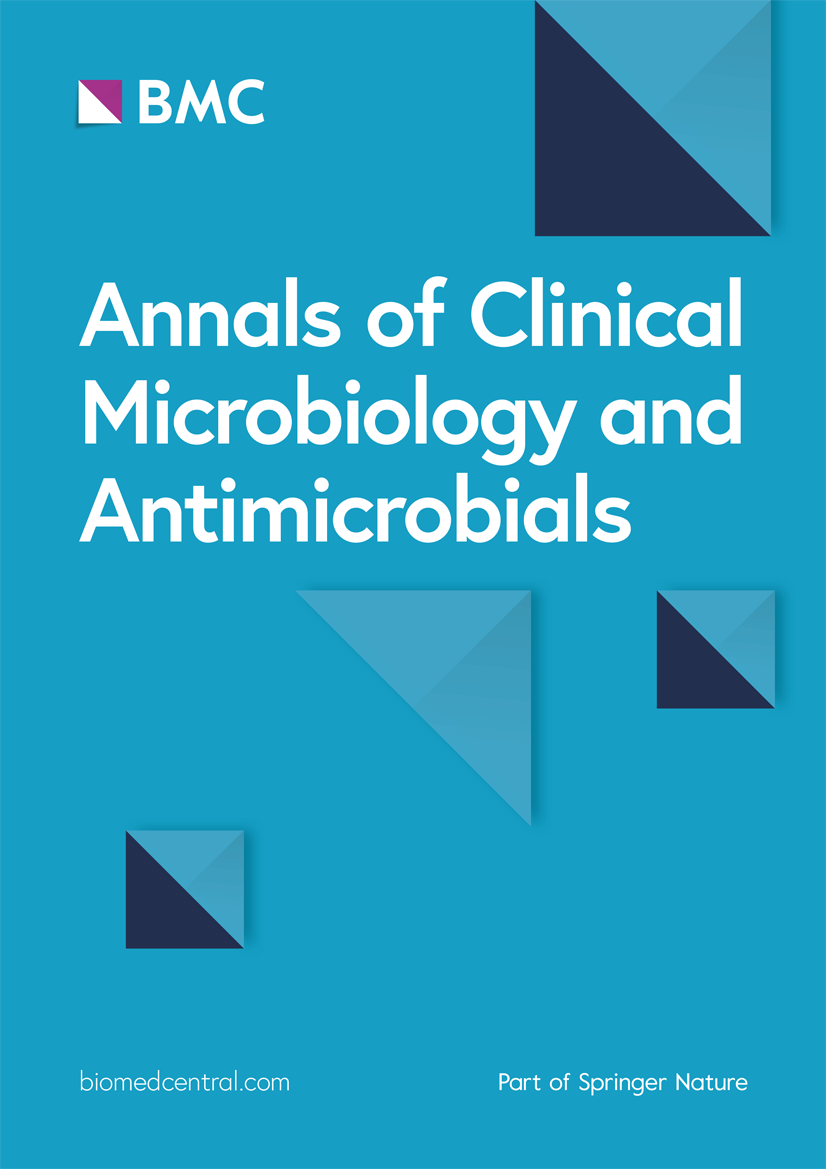Antimicrobial resistance prediction by clinical metagenomics in pediatric severe pneumonia patients
IF 4.6
2区 医学
Q1 MICROBIOLOGY
Annals of Clinical Microbiology and Antimicrobials
Pub Date : 2024-04-15
DOI:10.1186/s12941-024-00690-7
引用次数: 0
Abstract
Antimicrobial resistance (AMR) is a major threat to children’s health, particularly in respiratory infections. Accurate identification of pathogens and AMR is crucial for targeted antibiotic treatment. Metagenomic next-generation sequencing (mNGS) shows promise in directly detecting microorganisms and resistance genes in clinical samples. However, the accuracy of AMR prediction through mNGS testing needs further investigation for practical clinical decision-making. We aimed to evaluate the performance of mNGS in predicting AMR for severe pneumonia in pediatric patients. We conducted a retrospective analysis at a tertiary hospital from May 2022 to May 2023. Simultaneous mNGS and culture were performed on bronchoalveolar lavage fluid samples obtained from pediatric patients with severe pneumonia. By comparing the results of mNGS detection of microorganisms and antibiotic resistance genes with those of culture, sensitivity, specificity, positive predictive value, and negative predictive value were calculated. mNGS detected bacterial in 71.7% cases (86/120), significantly higher than culture (58/120, 48.3%). Compared to culture, mNGS demonstrated a sensitivity of 96.6% and a specificity of 51.6% in detecting pathogenic microorganisms. Phenotypic susceptibility testing (PST) of 19 antibiotics revealed significant variations in antibiotics resistance rates among different bacteria. Sensitivity prediction of mNGS for carbapenem resistance was higher than penicillins and cephalosporin (67.74% vs. 28.57%, 46.15%), while specificity showed no significant difference (85.71%, 75.00%, 75.00%). mNGS also showed a high sensitivity of 94.74% in predicting carbapenem resistance in Acinetobacter baumannii. mNGS exhibits variable predictive performance among different pathogens and antibiotics, indicating its potential as a supplementary tool to conventional PST. However, mNGS currently cannot replace conventional PST.通过临床元基因组学预测儿科重症肺炎患者的抗菌药耐药性
抗菌药耐药性(AMR)是儿童健康的一大威胁,尤其是在呼吸道感染方面。准确识别病原体和 AMR 对有针对性的抗生素治疗至关重要。元基因组新一代测序(mNGS)有望直接检测临床样本中的微生物和耐药基因。然而,通过 mNGS 检测预测 AMR 的准确性还需要进一步研究,以便做出切实可行的临床决策。我们旨在评估 mNGS 在预测儿科重症肺炎 AMR 方面的性能。我们于 2022 年 5 月至 2023 年 5 月在一家三级医院进行了回顾性分析。我们对重症肺炎儿科患者的支气管肺泡灌洗液样本同时进行了 mNGS 和培养。通过比较 mNGS 与培养检测微生物和抗生素耐药基因的结果,计算了敏感性、特异性、阳性预测值和阴性预测值。与培养相比,mNGS 在检测病原微生物方面的灵敏度为 96.6%,特异性为 51.6%。19 种抗生素的表型药敏试验 (PST) 显示,不同细菌的抗生素耐药率存在显著差异。mNGS 预测碳青霉烯类耐药性的灵敏度高于青霉素类和头孢菌素类(67.74% 对 28.57%,46.15%),而特异性则无显著差异(85.71%,75.00%,75.00%)。在预测鲍曼不动杆菌对碳青霉烯类耐药性方面,mNGS 也显示出 94.74% 的高灵敏度。mNGS 在不同病原体和抗生素之间表现出不同的预测性能,这表明它具有作为传统 PST 补充工具的潜力。不过,mNGS 目前还不能取代传统的 PST。
本文章由计算机程序翻译,如有差异,请以英文原文为准。
求助全文
约1分钟内获得全文
求助全文
来源期刊

Annals of Clinical Microbiology and Antimicrobials
MICROBIOLOGY-
CiteScore
8.60
自引率
0.00%
发文量
49
审稿时长
>12 weeks
期刊介绍:
Annals of Clinical Microbiology and Antimicrobials considers good quality, novel and international research of more than regional relevance. Research must include epidemiological and/or clinical information about isolates, and the journal covers the clinical microbiology of bacteria, viruses and fungi, as well as antimicrobial treatment of infectious diseases.
Annals of Clinical Microbiology and Antimicrobials is an open access, peer-reviewed journal focusing on information concerning clinical microbiology, infectious diseases and antimicrobials. The management of infectious disease is dependent on correct diagnosis and appropriate antimicrobial treatment, and with this in mind, the journal aims to improve the communication between laboratory and clinical science in the field of clinical microbiology and antimicrobial treatment. Furthermore, the journal has no restrictions on space or access; this ensures that the journal can reach the widest possible audience.
 求助内容:
求助内容: 应助结果提醒方式:
应助结果提醒方式:


